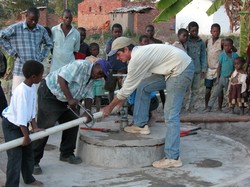Presbyterian mission co-worker Jim McGill and his Malawian Presbyterian colleagues are on a quest to deliver health and hope to people who lack clean drinking water.
McGill works alongside the Church of Central Africa Presbyterian’s Livingstonia Synod in its Water for All project. According to government estimates, about 300,000 people in northern Malawi, the region served by the synod, lack access to clean drinking water. That’s approximately one-quarter of the population.
In developing countries, more people die from water-related illnesses, including diarrheal diseases, typhoid, cholera, and hepatitis A, than from AIDS. These diseases are preventable, McGill says, if people have clean drinking water.
The Water for All project works with communities to find the best way to develop safe and accessible water sources. Their options include wells, household water treatment, and piped water.
In a village near Livingstonia, life is much better thanks to the water lines that the Water for All project helped the villagers install. Previously water came from a source more than a half mile away and was carried in pots on the heads of women. It was time-consuming and exhausting work, and the water was unsafe to drink.
Tigone, a village leader, remembers the day when seven people became ill with diarrhea and were taken to the Presbyterian hospital at the Livingstonia mission station. Six of them were treated successfully, but one person died.
Dirty water no longer kills people in this village. “Now that we have the pipes, we have seen a reduction of diarrhea in our village,” Tigone says. “Now women have more time for family activities than they had before when they had to walk long distances to collect water.”
McGill says access to clean water improves the overall well-being of families. Children are better educated because they miss fewer days of school due to sickness. There is more time to tend crops that provide food and income, and personal hygiene is enhanced.
Around northern Malawi, thousands of communities drink from wells that would not be there if not for the work of McGill, the Synod of Livingstonia and other partners. Some of the wells were dug with shovels; others were drilled by hand or machine.
The synod emphasizes that it helps provide access to clean water because the synod wants to model Christ’s concern for all people, McGill says. However, he notes that the synod also stresses that the water sources belong to the communities they serve and are for people of all religious beliefs.
McGill, who holds a master’s degree in geological engineering, has worked in Africa for two decades. He serves alongside his wife, Jodi, a nurse educator.
The Malawian government says people have access to clean water if they live within 500 yards of a drinkable water source that has no more than 250 people using it. McGill and the Synod of Livingstonia have a much higher goal. They want 100 percent of the people to have water piped into their houses. “That might sound like pie in the sky," McGill says, "but I think that’s a goal we should have.

